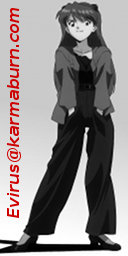|
|
There is a moment in Chapter 54 of the Love Hina manga that perfectly exemplifies the two main themes that ensured the series' success: Emotional resonance punctuated with giant robots.
You see, a romantic is not someone obsessed with affection and happiness. A romantic is someone who in the absence of affection and happiness retains a (usually unjustifiable) confidence in hope.
Love Hina is richly steeped in romance. However, from a creative perspective, romance alone is not enough. Giant robots—the absurd, the unexpected—are also occasionally needed in the calculus. It's the yin-yang thing at work, y'know.
The presence of the former without the latter can cause an otherwise sweet story to become saccharine. Likewise, the presence of the latter without the former will often prevent an audience from developing an emotional commitment strong enough to care about the characters or the direction of the narrative.
This is hardly an original idea. Fans of Buffy the Vampire Slayer will recognize this theorem from a similar statement made by Joss Whedon on the Season Two DVDs. (I am substituting "giant robots" for Whedon's "rocket launchers," but the reasoning is unchanged.)
I am mentioning all of this for two reasons. First, with the new fall television season upon us, I think you'll notice that the success or failure of any given show will depend heavily on how it balances these two thematic elements. Although it is a fairly trivial matter to predict a new show's future by measuring the amount of pure, unadulterated suck it delivers through one's television set, nevertheless, it may be interesting to evaluate the shortcomings objectively. Second, I just wanted to say in a roundabout, excessively verbose, indirect way that the Love Hina manga is like the best thing ever—even better than the anime. Rest assured that despite being 14 books long, it doesn't have nearly as much filler as I've posted here today.
Be sure to tune in next time when I post my 29,000-word thesis on why Asuka wears her plug suit's hair clips all the time. (Short answer: Asuka interprets her own personal worth solely through her identity as an Eva pilot. Bonus answer: Similarly, Shinji uses his SDAT player to physically manifest what Ritsuko calls his "hedgehog's dilemma.") And there will be more fan service, too!
Posted in Love Hina, Love Hina (manga) | Tags: Harem Comedy, Manga, Romance, tsundere | Permanent Link
Amazing. Volume 14 of the Ai Yori Aoshi manga was fully awesome.
If you've been following this site for a while, you may remember that I have a curious love affair with the wretchedness that is Ai Yori Aoshi. The anime is mostly mediocre, with a few really good moments, and a lot of really lousy ones. Still, I collected box sets of both seasons, purchasing or pre-ordering the DVDs individually. The anime exemplifies much of what is wrong with harem shows and contains stupid gimmicks and antics. I watch it anyway. This is because at the heart of Ai Yori Aoshi lies a vein of romance pure to the spirits of hope, love, and passion. But yeah, it's mostly shitty.
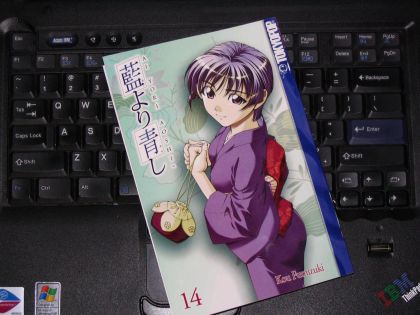
Ai Yori Aoshi manga volume 14.
However, the Ai Yori Aoshi manga is actually pretty good most of the time. It suffers from some of the same problems as the anime now and then, but at least it doesn't suffer from the disjointed narratives plaguing the episodes of the anime that tried to adapt extended manga plot lines via the dubious method of "just cramming everything all together." This isn't plot advancement; it's called "not making any sense."
In the Ai Yori Aoshi manga, the plot may advance slowly, but the plot does progress naturally. In volume 14, it leaps. I don't want to reveal the spoilers explicitly, but I will say that they involve the following aspects:
- You know how it doesn't make sense that after all this time nobody has found out about Aoi and Kaoru? Yeah, at least one person has known all along.
- The story arc in Enishi about Tina returning to America that was resolved in a single episode? It's much more extended in the manga and actually has a reason behind it.
- There's a bit of retconning regarding Tina's past, but it is consistent with other elements depicted thus far; it's conceivable that it was planned all along.
- Mayu confronts her feelings. (Mayu, you'll recall, has always been completely unguarded about her devotion to Kaoru...err...Hanabishi-samaaaaaaaaaaaa. For example, see how Mayu turned the tables on Tina in volume 13 with regard to the onsen prank. She's in love with him, and makes damn sure everyone knows about it. And how.) Anyway, the volume-14 bit about Mayu confronting her feelings is a little different than you might expect.
- Someone important to the plot dies.
- THAT'S RIGHT.
Oh, and there is a bonus side-story chapter about one of Chika's friends and her newfound May-December romance. So tawdry.
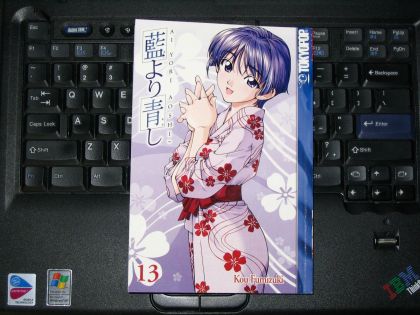
Ai Yori Aoshi manga volume 13.
Ai Yori Aoshi volume 14 is excellent, and Tokyopop's adaptation of it again finds zero complaints from me. All y'all should buy it, but if you haven't been reading the manga, you'll want to pick up volume 13 as well.
Posted in Ai Yori Aoshi, Manga | | Permanent Link
There's a third Love Eva manga, Neon Genesis Evangelion Gakuen Datenroku (Neon Genesis Evangelion Academy: Records of Heaven’s Descent). At least I think it's the third one; I may have lost track. Like the first Love Eva manga, known as Iron Maiden 2nd, Girlfriend of Steel 2, and Angelic Days (among other monikers), Evangelion Academy runs in Monthly Asuka.
Turtle Paradise Scanlations is up to chapter five as of this entry. They're using scans from Monthly Asuka itself, and meeting the same challenges I faced with its pulpy paper when I was scanning Iron Maiden 2nd for Studio ADTRW. Scanning-type issues aside, Turtle Paradise is doing a fine job so far, although I see they've found yet another spelling variant for "Soryu."
As far as the manga itself...it seems all right. I like how Rei totes around the Lance of Longinus. One thing I don't care for is how it—like just about every other Eva revision—tries to make Shinji less despicable and whiny. While that may make him less annoying, it kind of makes it Not Eva anymore—might as well just take the basic idea of the revision and turn it into an original title. Making Shinji less of cretin seem as unnatural to me as transforming Asuka into The Virgin Mary. Oh, wait...
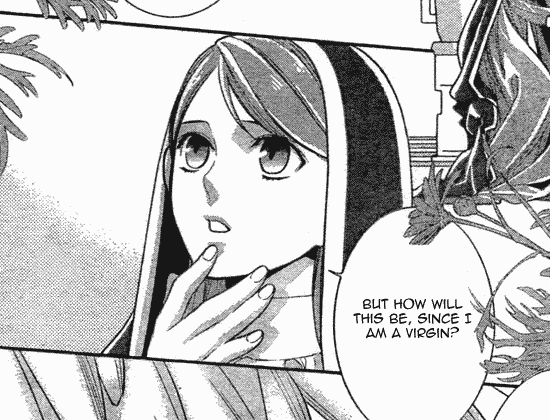
Sacrilicious.
Posted in Manga, Neon Genesis Evangelion | Tags: Asuka, Neon Genesis Evangelion | Permanent Link
I've confessed on multiple occasions that I really enjoy the Ai Yori Aoshi manga despite having a rather low opinion of its banal, freakishly-nipple-free anime adaptation—Kawasumi Ayako's soothing cooing as Aoi notwithstanding. It's not easy for me to explain exactly why I enjoy the manga so much. I think perhaps part of the reason is that it is so transparent with its ambitions.
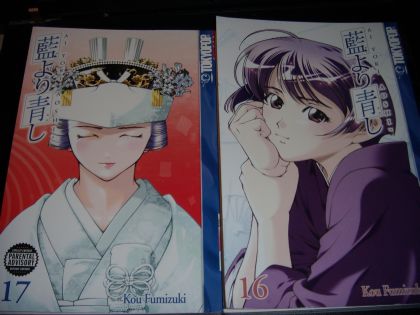
Ai Yori Aoshi volumes 17 and 16.
Compare the Ai Yori Aoshi promise with the central promise in Love Hina, a manga that is arguably as much about promises as it is about onsens and accidentlly seeing other people's butts. In Love Hina, the identity of the Promised Girl remains ambiguous for nearly the entire run, and even the terms of the promise itself come into question at times. Ai Yori Aoshi establishes an unambiguous promise in its opening chapters that never faces a serious challenge in the eyes of the reader.
Compare Ai Yori Aoshi with Ah! My Goddess. The committment between Keiichi and Belldandy never faces a credible challenge. The promise inherent in the wish has a large catalog of exceptions and loop-holes, but the underlying bond keeping Keiichi and Belldandy together will go on as long as it has to—this is a manga that never ends. Thankfully, the title focuses more now on the slice-of-life whacky-type adventures mostly driven by its extensive supporting cast, so it's still wildly entertaining. But I digress. Unlike Aa! Megami-sama, Ai Yori Aoshi ENDS.
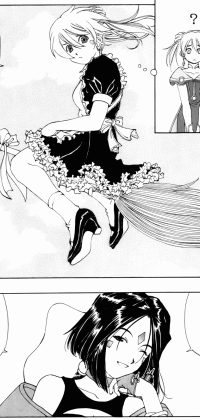
Why is an Aa! Megami-sama picture in an Ai Yori Aoshi entry?
I'm not sure, but it's probably Peorth's fault.
I am very pleased with how the Ai Yori Aoshi manga wrapped up the story in its final volumes. I did have some reservations at first when New Character appeared out of thin air, but it worked out well. Be content to think of the matter as a catalyst and be glad it wasn't a deus ex machina. (Ultimately, what happens to our main characters doesn't really require New Character's presence at all.)
Speaking of which, what does happen to Aoi and Kaoru? Well, I'm not going to outright spoil the climax or lay out the story, but the events in volume 17 should come as no surprise to anybody who has been paying even bare attention. Fans of the series should find the ending satisfying. A consumate professional, mangaka Fumizuki Kou nails it.
Posted in Aa! Megami-sama, Ai Yori Aoshi, Manga | | Permanent Link
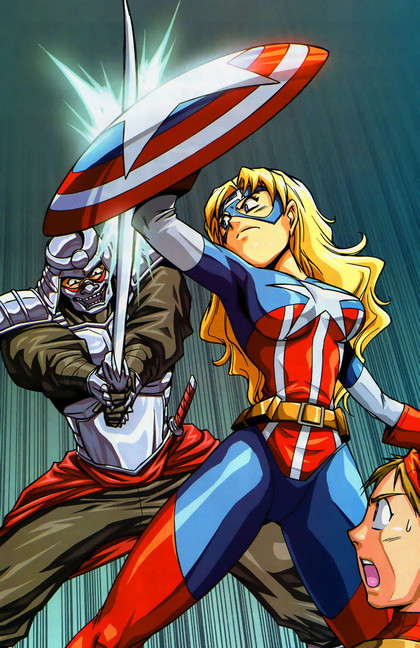
Carol Danvers as Captain America.
Just so you know, the Marvel Comics New Mangaverse series is all right.
Posted in Manga, Mangaverse | Tags: Built for Sin | Permanent Link
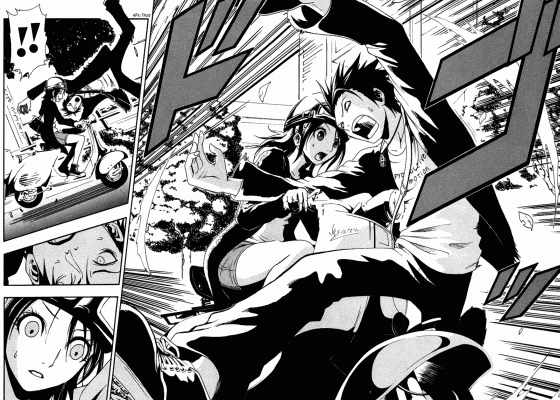
Way to watch the road, Kagura.
I watched Ga-Rei Zero despite numerous warnings from various people not to. They alleged the show is terrible, but I was willing to hazard that to find out what the deal is with Yomi. I won't tell you much about Yomi, but I will tell you people were wrong about the anime being terrible. I can understand why some people don't like it, though. First, Ga-Rei Zero pulls the rug out from under the viewer numerous times. [Spoiler: The lesbianism is a lie.] Moreover, the show does not take itself too seriously, and borders on self-parody on a few occasions. I can understand that some may also dislike the shifts in tone, but I rather enjoyed them. Finally, some complain the anime isn't true to the manga. Those complaints I don't really understand.
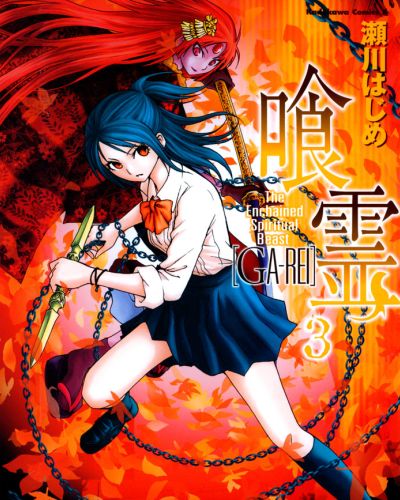
I like the art in the manga more than the covers.
I've started reading the Ga-Rei manga. (The Ga-Rei Zero anime is a prequel taking place two years prior to the opening chapter of the Ga-Rei manga.) I've completed the first 25 chapters, and I have to say the anime does not stray far from the spirit of the manga. Yes, there are notable differences, particularly in that the manga is told from the perspective of a male lead. I almost dropped the manga early on because I thought he was another shounen jive male protagonist, to tell you the truth. But while there is a lot of "I'm just a normal guy...except I can see ghosts" and a little too much "I MUST PROTECT HER!" there isn't much Bleach or Index-type exposition. Mercifully, the manga also does not take itself too seriously, and there are a lot of tongue-in-cheek jabs (including a ridiculous first kiss). There are even some tanuki jokes I know at least one person will appreciate. There's also some well-drawn fan service to go along with the admittedly shounen jive overall plot. My only real complaint with the manga is that the comic timing seems a little off. I can see the framework for the jokes, but the effect loses a little something in the translation. I suspect Ga-Rei likely reads a bit funnier in the original Japanese, but that's just speculation on my part. Oh, it also needs more Yomi, alas.
Posted in Ga-Rei, Ga-Rei Zero, Manga | Tags: Built for Sin, Girls With Guns, Hair, Hime Cut, Shounen Jive | Permanent Link
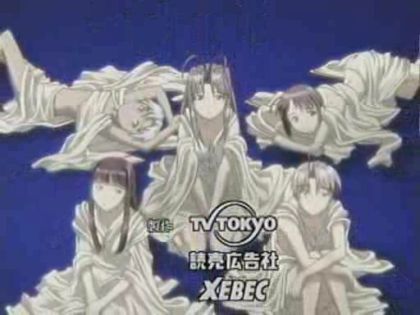
This was considered pretty good quality at the time.
All right, here goes: I never skip the opening and closing credits of any episode of anime I watch. That's right, I watch every single OP and ED of every single episode, even for episodes I've already seen before. The only time I skip an OP or ED is when the encode does not include them (as with many of these old ass Love Hina first-generation digisubs that I am sort of re-watching right now).
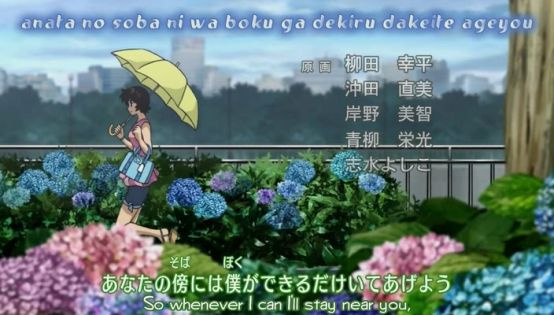
I admit dancing in the rain helped Shimizu win Best Girl of the Year.
Nearly every single time I've made the admission, the response has been incredulous. Yes, I know it's a very simple matter to set up a hotkey that jumps the video ahead 90 seconds (plus, better containers and, you know, actual store-bought discs permit you to chapter skip), but I don't watch every OP and ED because I'm too lazy or ignorant to skip them. I watch them every time because I consider them part of the show.

All right, I haven't bought the Ah! My Goddess series DVDs yet, okay?
At least I've purchased The Adventures of Mini-Goddess,
the OVA, the movie, and the manga already.
And since I consider OPs and EDs part of the show, how much I like or dislike an OP or ED affects how much I like the show as a whole. Disliking the Lucky Star OP is one of the reasons I've never finished watching the series. I do find Lucky Star a little boring (and I straight-up dislike Lucky Channel), but I probably would have finished watching it by now if I really liked the OP instead. Likewise, I am grateful the Macademi Wasshoi OP is horrible, because it guaranteed I would find the series not just terrible, but completely unwatchable after the first episode.
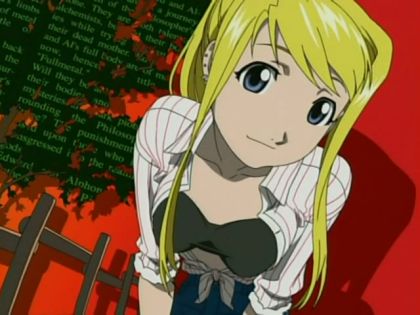
I like First Winry better even though she doesn't
have massive hips or manhands.
However, since I consider OPs and EDs "part of the show," does this mean I consider OPs and EDs canon? Well, no, although I suspect there are times we would all like to think of scenes depicted within OPs and EDs as canonical. For example, Shimizu dancing in the rain during Major season four, or the Winry's-daily-life EDs from either of the Fullmetal Alchemist series. These sequences are reasonably plausibly canon—as much so as the Aa! Megami-sama TV "date" ED which we know from the manga is canon.
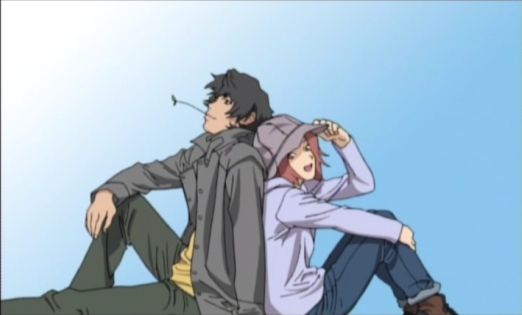
A bodyguard and his poor little rich girl.
What about ones like the Kaze no Yojimbo OP? Depending on your point of view, it might be nice to think those events actually happened, and from a certain perspective I can see how it's at least plausible, but I think it's more likely the scenes are pure misdirection—perhaps to divert some attention from what the show is really about. Not that OPs and EDs can't include misdirection and still be canon. Princess Tutu, I'm looking in your direction....
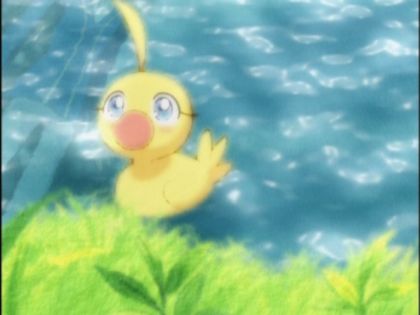
Ahiru as a duck. Unless you're ADV,
in which case it's Duck as a duck.
So what is worse? That I never skip OPs and EDs or that I care about them? Surely it's not that strange, is it? On days like these, I'm probably lucky I leave comments disabled.
Posted in Aa! Megami-sama, E/N, Fullmetal Alchemist, Fullmetal Alchemist: Brotherhood, Kaze no Yojimbo, Love Hina, Macademi Wasshoi!, Major, Princess Tutu | Tags: baseball, Childhood Friend, Comments Disabled, GIRL NEXT DOOR, Mahou Shoujo, OP ED, Poor Little Rich Girls, Spoilers | Permanent Link
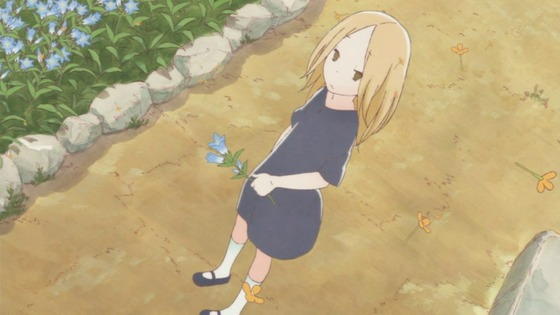
Daikichi's first impression of Rin is a recurring image.
Usagi Drop was one of the best shows from summer 2011, losing the top spot in my rankings only because of its brief 11-episode length. However, based on the outcry the original manga created, the anime's short run was its saving grace, due to the unspeakable horror of the manga's conclusion. Or so it goes.
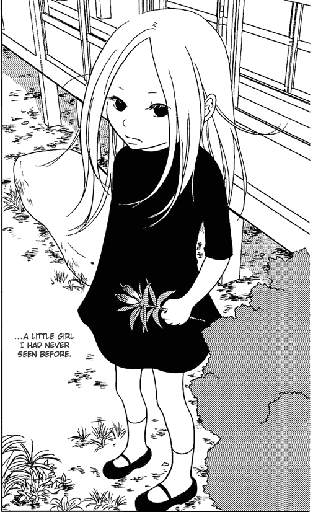
Daikichi sees Rin for the first time, manga version.
I've long learned of the otaku penchant for gross overreaction, so I took the time to read the entire manga myself—something I suspected many of its critics neglected to do. Based on my findings, I can understand why so many otaku reacted the way they did, but I personally had no issues with the manga's ending myself, possibly because I'm much less critical of anime and manga in general; I at least try not to group things into only two categories—AWESOME and HORRIBLE—there is a lot of stuff in that middle ground I enjoy, even if I don't necessarily enjoy all of it.
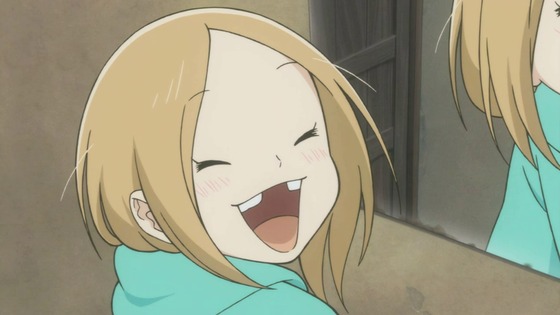
Here, the Usagi Drop anime ends.
The 11 Usagi Drop anime episodes duplicate the first 25 chapters of the 56-chapter manga almost scene for scene. The anime is very faithful to the source material. The anime also ends where it does because of the manga's timeskip. That's right, more than half of the Usagi Drop story occurs after the timeskip, so arguably the latter half is the "real" story which the first part merely sets up. At a minimum, a truculent reader should at least grudgingly acknowledge the second half is intended to be as important as the first half.
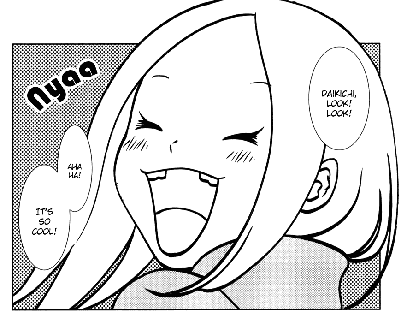
Here, the Usagi Drop manga is merely beginning.
Spoiler Warning: I won't explicitly discuss the manga events, but most readers will probably be able to easily guess the spoilers from context with little effort. When I first heard about the post-timeskip outrage, I compiled a mental list of likely spoilers based on what I knew about otaku and what I knew about Japan and what I had seen in other anime and manga. Sure enough, this list of possible rage-inducing outcomes included two of the spoilers that actually occurred in the manga, although to be fair, I was incorrect about a material detail about one of them and the one I was 100% correct on was the one I had already intuited from a scene in the anime before I had even heard about the entire controversy.
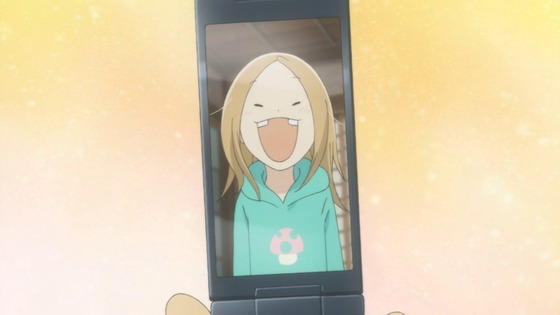
Rin shows off her missing teeth.
So why so much hostility towards the manga's ending? Frankly, I attribute it to one (or both) of two reasons. One, otaku might not be exposed to much western literature and theater if they spend most of their free time voraciously consuming manga and anime. Thus, their expectations as to what is appropriate or acceptable follow different conventions. Two, these conventions themselves are tailored in self-perpetuating otaku-friendly ways to be non-threatening. Yeah, most people angered by the Kannagi ex-boyfriend revelation were joking, but notice how none of the K-On! girls are permitted boyfriends either; even a supporting character requires plausible deniability—even in jest—when she is shown with a possible beau. This is not to say that strangers to manga and anime would not revile the Usagi Drop manga ending, but it's possible those with greater exposure to a variety of "acceptable" endings may give the title more latitude because they are more liberal with their expectations. Expectations are probably key here. For example, because its audience has different expectations, nobody bats an eye when Oedipus has sex with his mother and later puts out his eyes, and nobody cares when a Shakespeare tragedy concludes with a half-dozen dead bodies on the stage. And how many readers of the popular A Song of Ice and Fire fantasy novels are offended by all the rape, incest, and teenage brides?
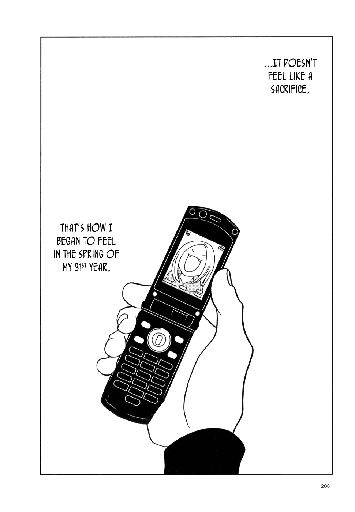
Tiny pictures are the way of love.
I do not claim it is improper for manga and anime fans to hold different expectations for these works, but I do feel that those embracing narrower allowances contribute to the apparently collective overreaction to the Usagi Drop ending. And I do think they overreacted, especially the ones who were offended by second- or third-hand reports about how it played out instead of investigating the matter themselves. I can understand not wanting to "stain" a cherished impression created by the first half of the story, but someone forcing himself to look away to avoid something he's predetermined to condemn as distasteful strikes me as amusingly immature.
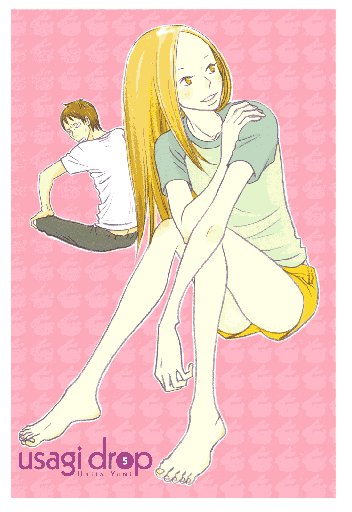
I forgot to mention timeskip Rin has legs that go up to her neck.
Yes, it turns out most of Usagi Drop is a teen drama, but it's not a bad teen drama unless you claim all teen dramas are bad as a matter of general principle. Guess what? After the timeskip, Rin is a teenage girl. And, like I said, since there are more chapters with Rin as a teenager than there are of Rin as a small child, Usagi Drop arguably is a teen drama. And it's not one of those teen dramas where nothing happens. There's kissing! There's sex! There's pregnancy! But there is also devotion and unrequited love.
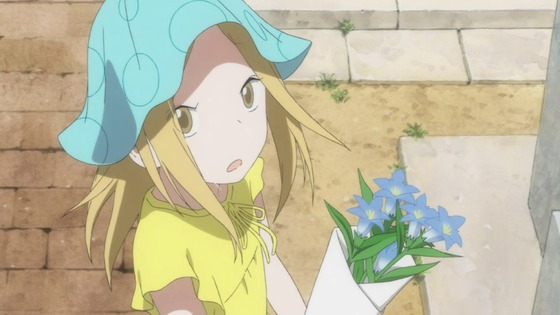
Rin pays her respects.
Frankly, none of this would even be possible were it not for two key elements established in the first half. First, Rin explicitly rejects Daikichi as a father when he broaches the subject. Second, six-year-old Rin is the sweetest, nicest, most well-mannered little girl in history, so Daikichi's parenting—as far as we are shown—consists almost entirely of having a job and being able to sign contracts. Instruction and discipline? Not so much.
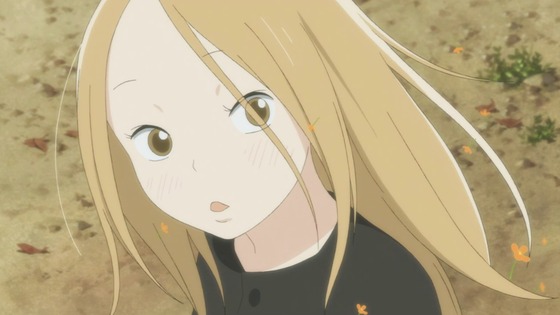
Daikichi remembers how he met Rin.
We also don't see much parenting with regard to Kouki. We know he needed more of it, since he was apparently quite a hellion, but Usagi Drop omits a lot of details. There are at least three really big incidents that occurred between the two arcs, but aside from oblique references to them, the reader remains entirely ignorant as to, you know, what happened.
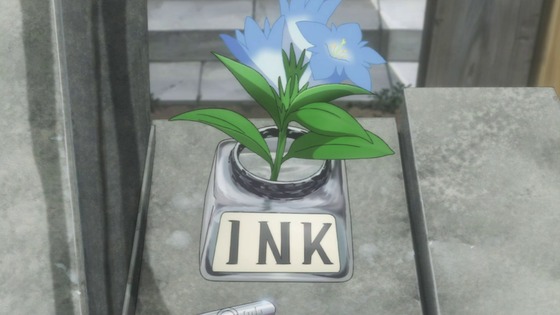
Rin's mother pays her respects.
I've probably said too much already, and if you can't figure out what the big deal is by now, you probably either don't know anything about Usagi Drop to begin with, or you weren't paying attention. If you have figured it out and still refuse to read the manga yourself because you're afraid of tarnishing the image formed by the anime, at least consider this: The first half of Usagi Drop is told from Daikichi's point of view. The second half is from Rin's and Kouki's points of view. This change is what makes the ending work for me.
Posted in Manga, RECOMMENDATIONS, Usagi Drop | Tags: 16-year-old love interests, Childhood Friend, Legs that go up to her neck, Manga, Shoujo, Summer 2011, Tiny Pictures Are the Way of Love, Unrequited Love | Permanent Link
|
|


